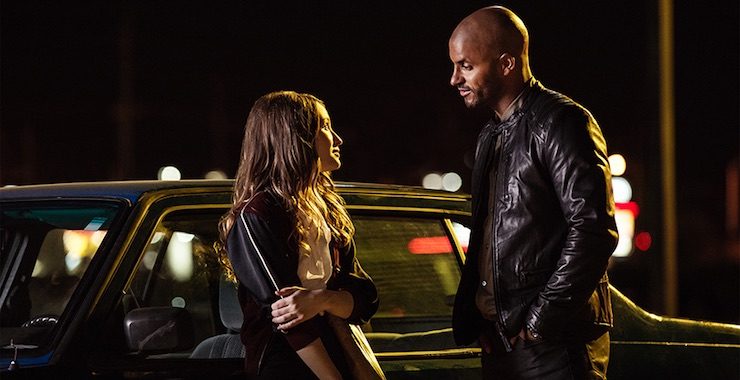Death comes for us all, but for some, it’s only the beginning. The fourth episode of American Gods sets aside the travels and travails of Shadow and Wednesday to watch the slow motion train wreck that is Laura Moon.
We’ve talked a lot about how American Gods differs between book and television show, about things that work, things that don’t, and how the changes alter the meaning of the story. “Git Gone” is the show’s greatest departure yet from the novel, and also one of the strongest. Gaiman’s story was remarkable, but it lacked depth when it came to race and women. While Bryan Fuller and Michael Green haven’t entirely succeeded in the former, they’ve done stellar work on the latter.
Book Laura doesn’t have much of a personality. We don’t meet her when she’s alive, and death has drained her of emotion. She can’t feel or taste, she just exists, appearing when Shadow needs her help and disappearing when he wants her to stay. TV Laura is a different beast entirely. In the novel, Shadow is the follower, the one who makes no choices and has no ambitions beyond doing whatever anyone tells him to do. Laura calls him “Puppy” because he follows her around like one. Yet in the show Shadow is much more involved and contrary—he challenges Wednesday, stands up to Czernobog, and resists magic.
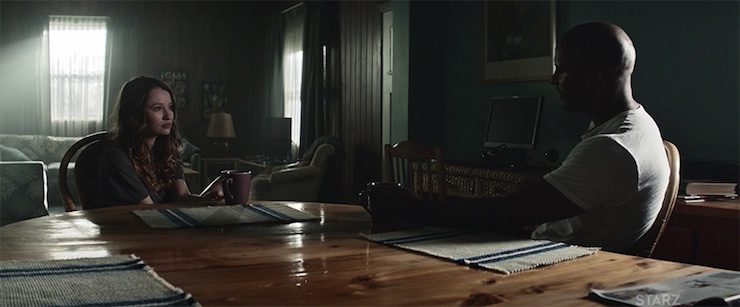
If anything, the version of Laura we meet here is closer to Book Shadow than Shadow is. She’s dead before she’s even dead. We don’t learn Laura’s maiden name, but it doesn’t matter anyway. Laura is alive, but she doesn’t live. Her past is as lifeless as her present, as barren as her future. It doesn’t matter where she came from or where she’s going (with or without Shadow) because the answers to both are “nowhere.” Their house was a hand-me-down, their jobs are meaningless and dead-end. There is no movement forward or backward.
Shadow offers romance, but Laura wants fire. He’s not supposed to stick around. Laura never asks him to stay…but she also never tells him to leave. Shadow tells her she makes him happy, but what Shadow can’t see is how much pressure that puts on her. She can’t manage to make herself happy but now she’s expected to be responsible for the entirety of Shadow’s happiness. He derives all his joy in life from Laura without realizing how draining that must be for her. He never asks her why she’s unhappy or what he could do to help her through it. She tells him to rob the casino and he agrees because of course he will. That she might be unhappy never occurs to him until it’s already too late. Laura was in stasis before she met Shadow, and all he brought was more stasis. A larger cage.
If you suffer from depression like I do, Laura’s flat-lining probably looks familiar. Depression can be like living in a fog, trapped in a world of emptiness—no pain, no desires, no nothing. Nothing pleasing can penetrate that fog, at least not for long, and the thought of living like that forever is crushing. Suicide becomes less a cry for help and more a means to an end, a way to get that emptiness to stop. Laura didn’t really want to die, she only wanted to feel again.
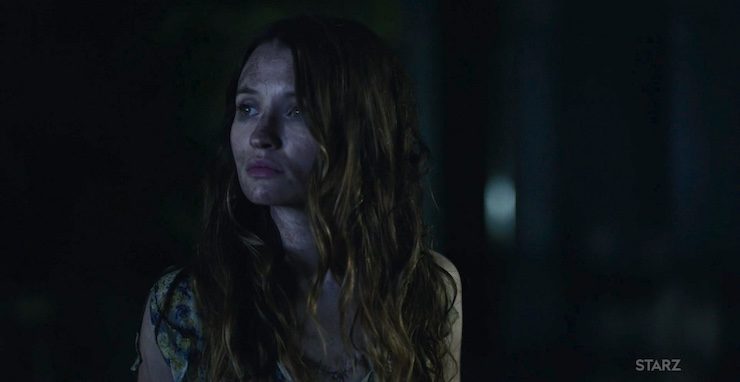
Laura’s frustration with Shadow’s submissiveness goes deeper than her marital problems. She picks Robbie (Dane Cook) because he bends just as easily. Laura pushes Shadow to be rough with her in bed and gets Robbie to seduce her because they’re easy conquests. She doesn’t have to offer anything of herself and gets everything in return, whether she wants it or not. But she also changes them in the process. Shadow isn’t by nature a rough sex kinda guy, and Robbie would’ve probably gone the rest of his life being faithful to Audrey. If Laura can change them, maybe she can change herself. Maybe they can change her.
Moreover, Robbie is (literally) a pale imitation of Shadow, but he has something her husband can’t offer: presence. Robbie is there and Shadow isn’t. Laura uses others to feel, albeit fleetingly, and without Shadow or the lure of crime, all that’s left is her best friend’s meathead hubby.
Audrey, in the season premiere, seeks sex with Shadow not just to feel, but to feel something else. Audrey is consumed by her grief, Laura is hollow. For Audrey, sex is a bandaid over that agonizing wound, yet for Laura it’s a bump of coke as she free falls into the howling void. But what unites them—other than Audrey’s craft supplies, car, and dead husband—is their mutual desolation. Laura had everything but valued nothing and lost it all. Audrey had everything and valued it so much she ignored the blistering flaws and lost it all anyway. What Audrey needs now isn’t an apology or closure or a reason why, but a connection.
Every pair of besties have had that one fight, that all-out, knockdown drag-out verbal brawl that stretches the bonds of friendship. The real test isn’t the battle itself but the resolution. If the friendship is strong enough to survive embalming fluid bowel movements and sewing arms back on, it can outlast an affair.
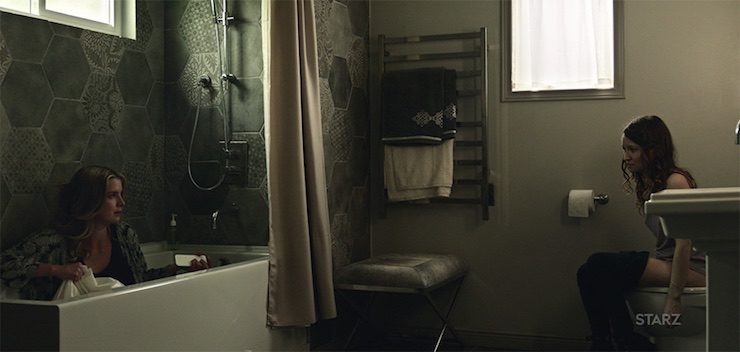
Consider what we knew of Laura before “Git Gone.” All we’re told is that she was Shadow’s lovely wifey who went inexplicably awry. From Shadow’s perspective, that last prison phone call had Laura keeping him grounded and calm and easing his worries with a soothing tone. But from Laura’s angle, it takes a darker tone. She’s placating him, giving him just enough to get him off the phone and not enough to reveal any truths to Robbie. Laura isn’t interested in making Robbie jealous or announcing her indiscretions. She simply doesn’t care about Shadow or Robbie’s feelings. She isn’t heartless or cruel, just chronically depressed and devastatingly lonely.
When we see the Moon house in the second episode, it looks like a family home full of life and hope. But in Laura’s episode, it’s dull and gray. Director Craig Zobel and cinematographer Darran Tiernan shoot her home life scenes in a world of muted tones. Outside the Moon house the world is lush and bright, but inside is dreary and dark. Red is the only color to break through: used in Woody Woodpecker, Git Gone bug spray, the kitchen curtain, the deck of cards, Shadow’s shirt when he’s asleep on the couch, the red wine, Robbie’s shirt when he first kisses her, Laura’s cardigan when she agrees to continue the affair, Robbie’s car, the blood from the fight with the Children. By the time she reunites with her true love, Shadow’s room is awash in red. When Laura reanimates, she literally can only see the world through saturated, dull tones—save Shadow, her golden, glowing sun.
Not until Anubis tries to take her heart does Laura finally react. And again, this time in Audrey’s car she practically vibrates with energy as she reads her lackluster obituary. But rather than triggering some introspection about how she lived her life, she tells herself a fairy tale about her death. She mimics the cloying romance Shadow used on her when they were married. Peek back at the feature image for this review. See how they’re framed, Laura bathed in golden light as Shadow looks at her like she’s the most incredible thing he’s ever seen. Now, for Laura, Shadow is the light of her life, her sunshine, her everything. After Mr. Ibis and Mr. Jacquel collect her from Audrey, they patch her up enough to appear human. But this too shall pass. Her fairy tale is fading fast. Not even death can cure depression.
Does she really believe all that sugary sweetness? It’s too early to tell, but it’s worrying that she has to keep repeating that she loves him. And note that even after she comes back to life and declares her undying love for Shadow, she still doesn’t say she’s happy. In un-death Laura gets everything she couldn’t have in life, but is it real? Does it matter if it is? Does it matter if it isn’t?
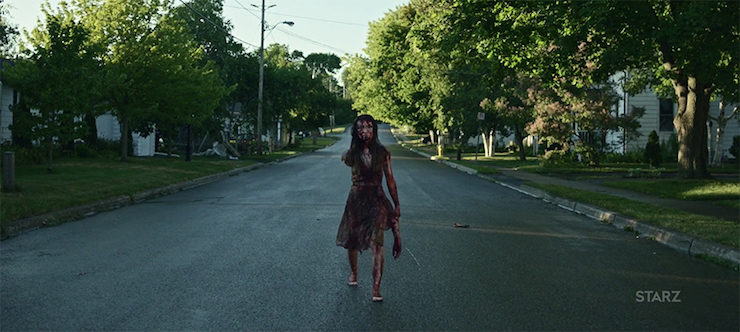
Music
- “Queen of the Bored”—Shirley Manson
- “The Weight”—The Band
- Anyone know the song playing in the first half of the car scene with Robbie and Laura? Don’t know enough contemporary country music to hazard a guess.
- “Stupid Girl” (remix)—Garbage: In the screener version, this was the placeholder song for “Queen of the Bored,” and I kinda liked it there. But hey, I’ll take any and all iterations of Shirley Manson.
Final Thoughts
- “The weak spot—all you need is one—is usually people’s attention.”
- “All I know is there’s more than I know.”
- “Yes, I see that you’re happy. From this side of this, from the wrong side of it. And I think that maybe I resent not being happy. Not resent you, just resent.”
- “I didn’t even like him.” A vague enough statement that she could mean Shadow or the cat.
- “Well, you had a shitty obituary because you had a shitty life. You were shitty…How could you live with yourself when you were actually living?”
- Unlike the other episodes, this was shot in 2:40 aspect ratio with anamorphic lenses, which gives it that cinematic, closed-in feel.
- Zobel directed “Git Gone;” he also did some of the best episodes of The Leftovers, including the bonkers “International Assassin.”
- Zombie Laura hiding from Shadow in the hot tub was such an eerie contrast to her previous visits. Took her a while to get there, but she still ended up dead in the hot tub.
- I can’t tell, does Laura have the sun coin or not? It wasn’t in the grave when Mad Sweeney went rummaging, but she doesn’t appear to be carrying it around, either. Is she the sun coin?
- Anubis chooses the animal form of a black dog rather than a jackal. This plays into both the Egyptian illustration of Anubis and the legends of black dogs as portents of death. The dog form he chooses looks a lot like a black Pharaoh Hound. Like the Sphynx cat from Episode 3, Pharaoh dogs didn’t exist in ancient Egypt, despite the name association.
- Mythology tidbit, part 1: Odin’s crows, Huginn and Muninn, were watching the Moons.
- Mythology tidbit, part 2: There’s a story about Loki turning into a black fly to interfere with Brokk and Eitri as they forged Thor’s hammer…
Alex Brown is a teen librarian, writer, geeknerdloserweirdo, and all-around pop culture obsessive who watches entirely too much TV. Keep up with her every move on Twitter and Instagram, or get lost in the rabbit warren of ships and fandoms on her Tumblr.










